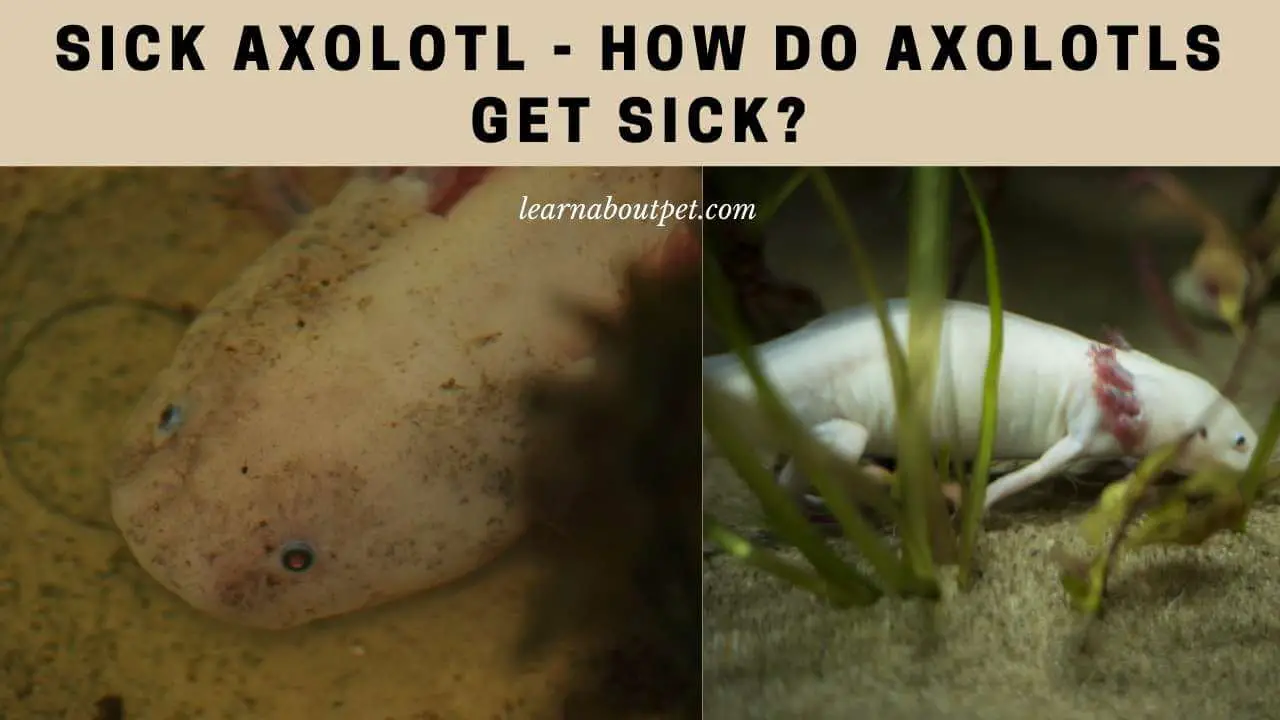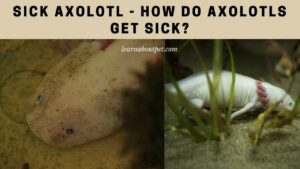Owning an axolotl and giving them a happy and healthy life is the complete responsibility of every axolotl owner and protecting critically endangered animals. You should know how the axolotls are when they are healthy and when they are sick.
How to know if you have a sick Axolotl? There are several signs your axolotl is sick, some of which are gills falling off, refusing to eat, shedding slime coat, floating, or swimming upside down.
You need to know what conditions can cause sick axolotl and provide the proper treatment for them. Let’s read this article to the end.

What Does A Sick Axolotl Look Like?
It depends on how sick the axolotl is and what the symptoms are. If the axolotl is infected, it will be visible on the gills. Axolotls will have overgrown gills, pale gills, and limp gills. If the color of their gills has returned to pink or red, then your axolotl is fine.
Sick axolotl can also be seen from its curled forward gills. You should examine the cause of your axolotl like this because some diseases can be from the condition of the water in the tank, the food given, or the axolotl’s silly behavior.
Another body part that can indicate sick axolotls is its tail. If their tail is up and they’re not moving around much, that’s a sign your axolotl is constipated and trying to poop despite the difficulty.
Axolotls can float with a tail up because they do not know how to remove too much or too great food that they have already eaten.
How Do Axolotls Get Sick?
Axolotls can get sick because of their behavior or other factors such as water quality, temperature, tank mates, or the environment. You will often see sick axolotl because they swim to the surface too often, and they are swallowing air bubbles and causing them to float.
This often happens to a baby or juvenile axolotls who still don’t really understand the condition of their bodies. In addition, their aggressive behavior, such as eating their tank mates, makes axolotls experience impaction or constipation because they do not know what they are eating.
Axolotls can also get sick because the tank temperature is too hot or too lousy water quality. This will trigger stress on the axolotl and lead to other illnesses such as heat stroke, ammonia poisoning, or infection.
For the environment, axolotls can get sick from swallowing gravel which can cause them to die. This is why axolotl owners prefer to choose fine sand for their substrate.
How Do You Treat A Sick Axolotl?
We can’t carelessly treat sick axolotls because we have to know the cause of their sickness. If we are mishandled, it can be fatal. In addition, axolotls are better not held directly by human hands so as not to hurt them.
For example, if your axolotl is experiencing constipation due to overfeeding, then you should reduce the amount of food they eat next time or give the axolotl some time to digest the food in its stomach.
If the axolotl has an infection, you can give them antibiotics even if it has to be in consultation with the vet. Or you can treat axolotl disease by looking at the water quality in the tank.
If the water quality has started to decline, your task is to clean the tank until the axolotl is comfortable with the water condition after it is clean.
Do Axolotls Carry Diseases?
Like other pets, axolotls can also carry disease, which will be dangerous if the axolotl has tank mates. One proof of axolotl carrying disease is if axolotl has salmonella in their intestinal tract.
Salmonella is a pack of bacteria that can be passed through waste. If axolotl tank mates get salmonella, they can get diarrhea, fever, or stomach pain.
Sick axolotl with salmonella can cause their tank mates digestive problems, and some can even get their intestines infected.
You need to separate the axolotls infected with salmonella until they can be treated until their intestines are clean, so they don’t get stomach problems that can be passed to other fish.
Sick Axolotl Symptoms
The symptoms often exhibited by the sick axolotl are loss of appetite, floating, and shedding. If you have distanced yourself from feeding your axolotl every 2 or 3 days, but they don’t want to eat even though the food is live food, then there may be a problem with your axolotl.
Axolotl sick symptoms can be related to the condition of the axolotl when they perform floating behavior because the axolotl may be experiencing constipation or impaction. When axolotls feel their stomach is complete, they don’t want to eat even if they are given their favorite food.
Floating axolotls can be of various types, such as floating with tail up, head down, upside down, or sideways.
Axolotl Lifespan
If you can treat axolotls in captivity by providing a proper diet, excellent water quality, suitable tank, and temperature, then your axolotls can last 10-15 years of their life expectancy.
Axolotls are long-lived aquatic pets with several requirements that must be met to stay healthy and live in their natural habitat.
Don’t let you encounter sick axolotl because we can hardly know what happened to them if you don’t always keep an eye on them.
Axolotls who are often sick can affect their lifespan because several things can make them more stressed and make their bodies worse.
How To Help A Sick Axolotl?
It depends on how you can help your sick axolotl with their problem. If the axolotl is experiencing constipation or bloating due to too much food, or sinking pellets they eat, then you can help the axolotl by allowing them not to be fed until their problem is resolved.

Do not feed regularly if you experience bloat or constipation will work the digestive system from the axolotl to return to normal.
For other problems such as axolotl gills, you must know how to do antibiotic therapy because gills are the organs for them to breathe. If you give the wrong way of giving antibiotics, it can be fatal for your axolotl.
Axolotl Diseases
Several common diseases make axolotls sick. Some can cause axolotl gills shrinking, which can interfere with breathing. If left for a long time, your axolotl can become short of breath.
One of the diseases that axolotls often get when they move to a new tank, or the water in their tank has started to get dirty because of something. Axolotls will get the disease when the water has been exposed to high ammonia or nitrate levels, which is toxic to them.
The most common disease is impaction because the axolotl is underfed and eats gravel on purpose. If the gravel has already been swallowed, then the only way that can be done is to perform surgical removal.
Although there are many other causes of disease, such as infection or poisoning, the two things above are the most frequently experienced by axolotl owners.
Axolotl Wound And Injuries
Sick axolotl can also be caused by an axolotl having an injury or wound in several parts of its body. If left untreated, the scar can get bacteria and cause infection. Look at some of the body parts such as fins, gills, or feet if there are cuts due to other fish or other axolotls.
Wounds can also be obtained from sharp edges in rocks or wood in-tank environments. Make sure you don’t put plants or rocks that can cause the axolotl to hurt.
Although the axolotl can regenerate, we also have to see how badly the axolotl is injured. If the axolotl only has minor injuries, then let them regenerate without receiving treatment from you, and you can help by always providing clean water.
Axolotl Eating Problems
Axolotls are notorious eaters, and they can eat anything that moves in front of them. If axolotls are careless with what they eat, they can eat anything even if it causes constipation or impaction.
Axolotls can eat tank mates if they are hungry. If the small fish has a hard spine or exoskeleton, then your axolotl may be choking because the hard bone can get stuck in their throat.
Another problem with the sick axolotl is being overfed or stressed. If the axolotl does not want to eat because they’re full, then they can float or bloat and be susceptible to disease.
Ensuring axolotls eat enough and a proper diet can make their lives healthier without having to eat anything in front of them. Arranging axolotl’s feeding schedule according to their age and size makes axolotl’s life healthier, and their digestive system works regularly.
What Are The Signs That An Axolotl Is Dying Due To Illness?
Starting from the sick axolotl changing diet, and also their eating portions are getting smaller. If they experience stress or infection, they will lose their appetite or not eat at all. This will make their immune system down and get sick easily if injured or have wounds.
You can also see from the scars and some parts of his body that started bleeding continuously. This is a sign that their body parts are seriously injured or have internal injuries. If left unchecked, it could be fatal. You can ask the vet about this condition.
If their coat is shedding, their skin is more susceptible to damage and susceptible ammonia or nitrate poisoning. Keeping the water and water quality clean will prevent this from happening.
Monitoring The Sick Axolotl
Several things can be monitored when you are facing a sick axolotl. Monitoring before giving treatment will make it easier for you to solve the problems experienced by your axolotl.
| Symptoms | Monitoring |
| Folded gills/tails | Monitor them for two or three days, and give them food one to two days to check their appetite. |
| Floating | Monitoring for a few days for their floating behavior until the axolotl does not perform the behavior. If it still continues for several days, immediately take it to the vet. |
| Eating problem | Stop one to two days from the usual schedule to see the effects of their digestive system so that it returns to normal. |
| Swelling on the limbs or head | Monitor for a few days and see other symptoms develop. |
Potential Treatment For Sick Axolotl
After monitoring to confirm the symptoms and see if other symptoms appear, the next step is properly treating the problem. If your sick axolotl has a minor injury, fungus, or bad water condition, you can take the axolotl for a salt bath so their body can adapt again.
If the axolotl has shrinking gills, check the water with a water testing kit. Fix the problems in terms of temperature, pH level, or whether or not the condition of the tank is dirty from axolotl’s waste.
If your axolotls are floating, you can feed them normally and let them swim around until they stop floating.
Final Verdict On Sick Axolotl
Keeping axolotls healthy will help them achieve their life expectancy. Many things can cause axolotls to get sick, such as poor water quality, temperatures that are not suitable for axolotls, stress, wound or injury, or the wrong diet.

You can see some symptoms when your axolotl is sick such as loss of appetite, shrinking gills, shedding slime coat, or floating upside down. Read more on Practical Axolotl research about it.
Monitoring when the axolotl is sick and seeing if there are other symptoms can help you provide the right treatment for your axolotl. Although the axolotl can regenerate, you must keep the axolotl healthy.

Welcome to Learn About Pet. My name is Rajkumar Ravichandran and I love all pets, travel, and amazing food. I write about my passion and personal experience caring for multiple pets in this blog! ❤️
Post Disclaimer
DISCLAIMER: THIS BLOG OR WEBSITE, "Learn About Pet", DOES NOT PROVIDE YOU WITH MEDICAL ADVICE AND IS NOT A SUBSTITUTE FOR MEDICAL ADVICE. ALWAYS GET IN TOUCH WITH YOUR PERSONAL VETERINARIAN AND USE INFORMATION HERE AS GENERAL ADVICE.
The information, including but not limited to, text, graphics, images and other material contained on this website are for informational purposes only. No material on this site is intended to be a substitute for professional veterinary advice, food recommendation, diagnosis, or treatment. Always seek the advice of your veterinarian or other qualified health care provider with any questions you may have regarding a medical condition or for pet food related questions.







